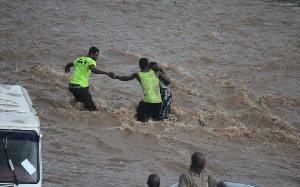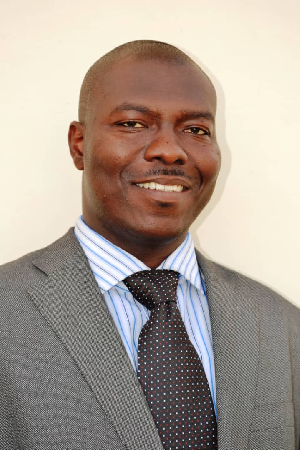- Home - News
- TWI News | TV
- Polls
- Year In Review
- News Archive
- Crime & Punishment
- Politics
- Regional
- Editorial
- Health
- Ghanaians Abroad
- Tabloid
- Africa
- Religion
- Election 2020
- Coronavirus
- News Videos | TV
- Photo Archives
- News Headlines
- Press Release
General News of Friday, 10 June 2016
Source: classfmonline.com
New Ghana capital needless – Geographer
Talk that Accra’s huge population, which has placed pressure on its facilities, coupled with the city’s low-lying topography, makes it flood-prone, for which reason a new capital for Ghana is required, has been described as needless, by Geographer Professor Emmanuel Amamoo-Okyere.
Prof Amamoo-Okyere, a former Executive Director at the Centre for Geographical Information Service (GIS) at the University of Ghana, said these in an interview with Prince Minkah on Class FM’s Executive Breakfast Show on Friday June 10 after a heavy downpour the previous day, which left most parts of Accra, submerged.
Dozens of people had to be evacuated from their homes in Adabraka, in the Greater Accra Region, by personnel from the Ghana Army, Ghana National Fire Service (GNFS), and the National Disaster Management Organisation (NADMO), after they were trapped in their homes and schools during long hours of heavy rains.
Dredgers and other heavy-duty machines decongesting the Odaw River, located close to the Kwame Nkrumah Circle, were all inundated.
Other areas which were affected by Thursday’s downpour include Kaneshie, Avenor, Weija, Alajo, the Stanbic Heights area within the Airport Residential Area, the Fiesta Royale area, and the Graphic Road, among others.
In a bid to find solutions to the flooding, which also led to the loss of over 150 lives at a Goil Fuel Station on June 3, 2015, the host asked the geographer if the capital of the country would have to be relocated due to its low and flat topography.
Deputy Ranking Member of Parliament’s Works and Housing Committee, Justice Joe Appiah had earlier suggested in an interview with Class FM's Parliamentary Correspondent, Ekow Annan that the capital city ought to be redesigned and if possible, relocated.
But Prof Amamoo-Okyere responded: “We do not need a new capital. We need to expand Kumasi and all the regional capitals.”
He suggested that the country must rather work towards “equalisation than trying to have a specific place to rebuild a new capital”.
To him, massive funding will be needed for such a large project, but he had his doubts citizens would benefit, as he feared government officials will only seek to line their pockets with such money.
“What money will that cost us? Where will the money come from and what honesty do people have [to use the money appropriately without siphoning]? Look at the Kwame Nkrumah Circle project, has anyone told us the engineering implications? We have not done any serious drainage work there. Who approved it and who is inspecting it? How much money has gone into it? It will come back to the same human factor of us not being honest with ourselves. Billions of dollars will be spent in building a new capital and at the end, we will ask ourselves what went wrong,” he noted.
“Go to Rotterdam, it was under the sea. So, if we want to rebuild, it can be done, but if you want a new capital to solve these things [like floods], then I am sorry. It is like an Ananse story. Unless we change our attitude of doing things [the country will suffer].
“Most of the occasion, public interests are as a result of an individual’s own interest that has been engineered to appear like a public interest. For me, Accra is historical. How many capitals have you seen being moved across the world? London is still there, Amsterdam is still there, Berlin was, but changed and now it is gone back to Berlin.”
He, therefore, suggested a re-engineering of the whole capital to solve the perennial flooding associated with the rainy season.
“We have to do a specific, accurate mapping of wherever there are floods and incorporate it with all plans we want to execute and if discipline is working, we should stop sprawling, which has spread all the way to the mountains”.











